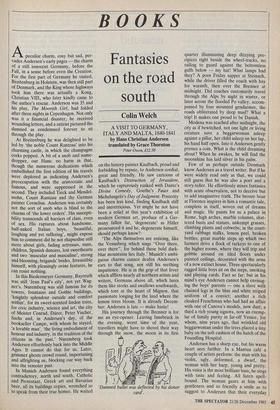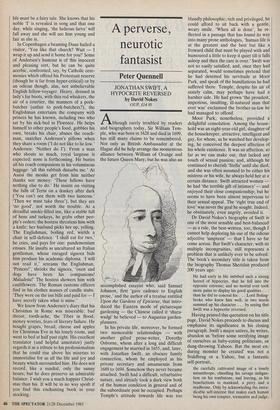BOOKS
Fantasies on the road south
Colin Welch
A VISIT TO GERMANY, ITALY AND MALTA, 1840-1841 by Hans Christian Andersen translated by Grace Thornton Peter Owen, £12.50 Apeculiar charm, cosy but sad, per- vades Andersen's early pages — the charm of a still innocent Germany, before the Fall, in a sense before even the Creation. For the first part of Germany he visited, Breitenburg in Holstein, was then still part of Denmark, and the King whose highways took him there was actually a Kong, Christian VIII, who later kindly came to the author's rescue. Anderson was 35 and his play, The Moorish Girl, had folded after three nights in Copenhagen. Not only was it a financial disaster; he received wounding letters, and a satirist pictured the damned as condemned forever to sit through the play. At Breitenburg he was delighted to be led by 'the noble Count Rantzau' into his charming castle, in which the champagne corks popped. A bit of a snob and name- dropper, our Hans: no harm in that, though the numerous dedications which embellished the first edition of his travels were deplored as indicating Andersen's preoccupation with the aristocratic and famous, and were suppressed in the second. They included Tieck and Mendel- ssohn, Count Rantzau and the German painter Cornelius. Andersen was certainly not the sort of snob who is blind to the charms of 'the lower orders'. His suscepti- bility transcends all barriers of class, even of sex. His raptures about handsome, half-naked Italian boys, 'beautiful, laughing and yet suffering', might expose him to comment did he not rhapsodise still more about girls, fading actresses, nuns, children, Spanish dancers, lost sweethearts and two 'muscular and masculine', strong and blooming, brigands' brides. Irresistible himself, with pleasingly ovine features, he can resist nothing. In this Biedermeyer Germany, Bayreuth was still 'Jean Paul's city', not yet Wag- ner's. Nuremberg was still famous for its towers, fountains and Gothic buildings, `knightly splendour outside and comfort within', for its sweet-scented linden trees, for civic industry, science and art, the city of Meister Conrad, Dfirer, Peter Vischer, Sachs and, in Andersen's day, of the bookseller Campe, with whom he stayed, `a lovable man', 'the living embodiment of honour and industry, in the tradition of the citizens in the past.' Nuremberg took Andersen effortlessly back into the Middle Ages. It cannot do that for us. Later, grimmer ghosts crowd round, importuning and affrighting us, blocking our way back into the remoter past. In Munich Andersen found everything contradictory, north and south, Catholic and Protestant, Greek art and Bavarian beer, all its buildings copies, wrenched so to speak from their true homes. He waited on the history painter Kaulbach, proud and forbidding by repute, to Andersen cordial, great and friendly. He saw cartoons of Kaulbach's Destruction of Jerusalem, which he rapturously ranked with Dante's Divine Comedy, Goethe's Faust and Michelangelo's Day of Judgment. Posterity has been less kind, finding Kaulbach stiff and meretricious. Yet might he not have been a relief at this year's exhibition of modern German art, produce of a Ger- many fallen far, 'degenerate' as Hitler pronounced it and he, degenerate himself, should perhaps know?
`The Alps themselves are enticing, like the Venusberg which sings "Over there, over there", for behind these bold dark- blue mountains lies Italy.' Munich's ambi- guous charms cannot deafen Andersen's ears to that song, nor still his seething impatience. He is in the grip of that fever which afflicts nearly all northern artists and writers, Germans above all, which lures them like storks and swallows southwards, which tore at the heart of Mignon, that passionate longing for the land where the lemon trees bloom. It is already Decem- ber: Andersen is late — make haste!
His journey through the Brenner is for me an eye-opener. Leaving Innsbruck in the evening, worst time of the year, travellers might have to shovel their way through the snow, the moon in its first 'Damned bullet was deflected by his d▪ onor card'. quarter illuminating deep dizzying pre- cipices right beside the wheel-tracks, no railing to guard against the bottomless gulfs below — my hat! What lamps had they? A poor Friday supper at Steinach, while the driver filled the coach with hay for warmth, then over the Brenner at midnight. Did coaches customarily travel through the Alps by night in winter, or later across the flooded Po valley, accom- panied by four mounted gendarmes, the roads obliterated by deep mud? What a trip! It makes one proud to be Danish.
Modena was reached after midnight, the city as if bewitched, not one light or living creature save a beggarwoman asleep against a pillar, her child asleep on her lap, his hand half open. Into it Andersen gently presses a coin. What is the child dreaming about? When he awakes, he will find the moonshine has laid silver in his palm.
Few of us perhaps outside Denmark know Andersen as a travel writer. But if he were widely read only as that, we could still guess that he was also a poet and a story-teller. He effortlessly mixes fantasies with acute observation, not to deceive but to add imaginative truth. The bronze boar at Florence inspires in him a romantic tale, complete in itself, woven out of dreams and magic. He paints for us a palace in Rome, high arches, marble columns, shat- tered busts and statues, unkempt grasses, climbing plants and cobwebs; in the court- yard cabbage stalks, lemon peel, broken bottles; great marble steps up which two farmers drive a flock of turkeys to one of the higher rooms, where they will trip and gobble around on tiled floors under painted ceilings, decorated with the arms of a now extinct house. Three spectacularly ragged little boys sit on the steps, smoking and playing cards. Fact so far: but in his mind's eye Andersen cannot help envisag- ing the boys' parents — one a slave with chained legs in the blue and white striped uniform of a convict; another a rich cloaked Frenchman who had had an affair with one of Canova's models, now dust; a third a rich young signora, now an exemp- lar of family purity in far-off Venice, for whom, nine years ago, that wrinkled old beggarwoman under the trees placed a tiny baby on the soft cushion of the hatch of the Foundling Hospital.
Andersen has a sharp eye, but his warm heart sees further. In a Mantua cafe a couple of artists perform: the man with his violin, ugly, deformed, a dwarf, the woman with her harp, young and pretty. His voice is the most brilliant bass; he sings with taste and feeling. All listen spell- bound. The woman gazes at him with gentleness and so friendly a smile as to suggest to Andersen that their everyday life must be a fairy tale. She knows that his noble 'I' is revealed in song and that one day, while singing, 'the hideous larva' will fall away and she will see him young and fair as she is.
In Copenhagen a beaming Dane hailed a visitor, 'You like that church? Wait — I wrap it up and send it home for you!' Some of Andersen's humour is of this innocent and pleasing sort, but he can be quite acerbic, confronted, say, by Catholic cere- monies which offend his Protestant reserve (though he is far from hyper-critical) or by an odious though, alas, not unbelievable English fellow-voyager. Heavy, dressed in lady's fur boots, with thin red whiskers, the air of a courtier, the manners of a pork- butcher (unfair to pork-butchers?), the Englishman entertains the company with princes he has known, including two who sat by his sick-bed in Florence. He helps himself to other people's food, gobbles his own, breaks his chair, abuses the coach- man, snatches Andersen's pillows when they share a room CI do not like to lie low.' Andersen: 'Neither do I'). From a man who shouts so much, royal largesse is expected: none is forthcoming. He buries all his coach companions in his voluminous luggage: 'all this rubbish disturbs me.' At Assisi the monks get from him neither thanks nor money: 'These fellows have nothing else to do.' He insists on visiting the falls of Terni on a donkey after dark (`You can't see them with two lanterns.' `Then we must take three'), but they are `no good', not worth the trouble. At a dreadful smoke-filled inn, like a stable full of hens and turkeys, he grabs other peo- ple's orders; the hostess threatens him with a knife; her husband picks her up, yelling. The Englishman, boiling red, wields a chair in self-defence. 'I shall eat for two,' he cries, and pays for one: pandemonium ensues. He insults as uncultured an Italian gentleman, whose enraged signora bids him produce his academic diploma. 'I will not read it,' screams the Englishman. `Princes!', shrieks the signora, 'oxen and dogs have been his companions! Maladettar The hostess showers him with cauliflowers. The Roman customs officers find in his clothes masses of candle stubs. `They were on the inn bills and paid for — I have merely taken what is mine.'
We know from Andersen's diary that his Christmas in Rome was miserable: bad throat, tooth-ache, the Tiber in flood, money worries, fears of literary failure. He bought grapes, bread, cheese and apples for Christmas Eve in his lonely room, and went to bed at half past eight. His excellent translator (and helpful annotator) justly regards it as a tribute to his professionalism that he could rise above his miseries to immortalise for us all the life and joy and beauty which surrounded him. He does not record, like a sundial, only the sunny hours; but he does preserve an admirable balance. I wish you a much happier Christ- mas than his. It will be in no way spoilt if you find this enchanting book in your stocking.



















































































 Previous page
Previous page